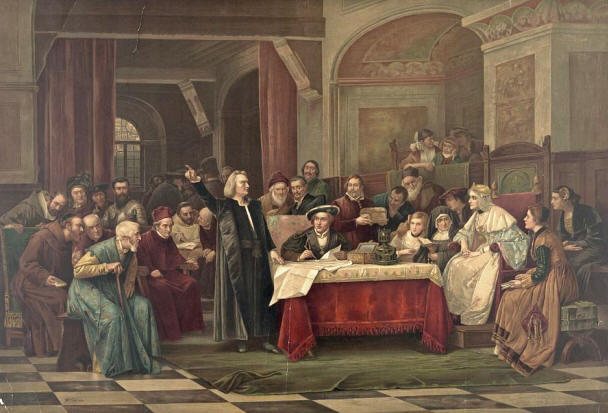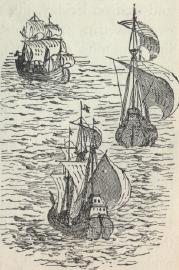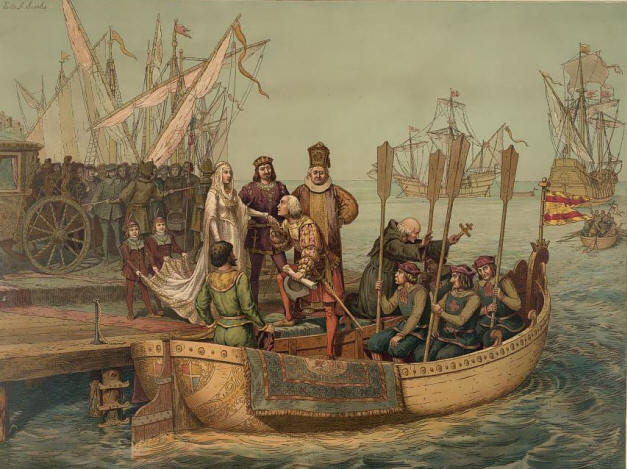Columbus
Approaches the Spanish Court Arriving at Cordova, Columbus found the city a great military
camp, and all Spain aroused in a final effort to expel the Moors.
Fernando, the Confessor, was a very different man from Perez, and
instead of treating Columbus kindly, received him coolly, and for a
long while actively prevented him from meeting the king. The
Copernican theory, though held by some, was not at this time
established.
At length, through the friendship of de Quintanilla, Comptroller
of the Castilian Treasury, Geraldini, the Pope's nuncio, and his
brother, Allessandro, tutor of the children of Ferdinand and
Isabella, Columbus was made known to Cardinal Mendoza, who
introduced him to the king. Ferdinand listened to him patiently, and
referred the whole matter to a council of learned men, and it was
not till 1491 (six years later) that the Commission reported the
project "vain and impossible, and not becoming great princes to
engage in on such slender grounds as had been adduced."

Columbus Before
Queen Isabella and the Spanish Court The report of the Commission seemed a death blow to the hopes of
Columbus. Disappointed and sick at heart, and disgusted at six years
of delay, Columbus turned his back on Spain, "indignant at the
thought of having been beguiled out of so many precious years of
waning existence." Determined to lay his project before Charles
VIII, of France, he departed, and stopped over at the little
Monastery of La Rabida, from whose Prior, Juan Perez, six years
before, he had departed with such sanguine hopes, for Cordova.
The good friar was greatly moved. Finally he concluded to make
another and final effort. Presuming upon his position as the queen's
Confessor, Perez made an appeal direct to Isabella, and this time
with the result that an interview was arranged, at which Isabella
was present. His proposals would have at once been accepted but that
Columbus demanded powers
* which even de
Talavera pronounced "arbitrary and presumptuous," though they were
of like character with those conceded by Portugal to Vasco de Gamba.
Angered and indignant at the rejection of his terms, which were
conditioned only upon his success, Columbus impulsively left the
royal presence, and taking leave of his friends, set out for France,
determined to offer his services to Louis XII.
* His principal
stipulations were (1) that he should have, for himself
during his life, and his heirs and successors forever, the
office of admiral in all the lands and continents which he
might discover or acquire in the ocean, with similar honors
and prerogatives to those enjoyed by the high admiral of
Castile in his district. (2) That he should be viceroy and
governor-general over all the said lands and continents,
with the privilege of nominating three candidates for the
government of each island or province, one of whom should be
selected by the sovereigns. (3) That he should be entitled
to reserve for himself one-tenth of all pearls, precious
stones, gold, silver spices, and all other articles and
merchandises, in whatever manner found, bought, bartered, or
gained within his admiralty, the cost being first deducted.
(4) That he, or his lieutenant, should be the sole judge in
all causes and disputes arising out of traffic between those
countries and Spain, provided the high admiral of Castile
had similar jurisdiction in his district.
Isabella Agrees to Support Christopher Columbus's Voyage But no sooner had Columbus gone, than the queen, who we may
believe regretted the loss of possible glory of discovery, hastily
dispatched a messenger after him, who overtook him when two leagues
away and brought him back.
Although Ferdinand was opposed to the project, Isabella concluded
to yield to Columbus his terms and agreed to advance the cost,
14,000 florins, about $7,000, from her own revenues, and so to Spain
was saved the empire of a New World. On May 12 Columbus took leave
of the king and queen to superintend the fitting out of the
expedition at the port of Palos. The hour and the man had at last
met.
Fitting Out the
Expedition 
What
thoughts and apprehensions filled the heart and mind of Columbus as
he at last saw the yearning desires of years about to be met, may be
to some extent conceived; they certainly cannot be expressed. Not a
general at the head of his great army who, at a critical moment in
battle, sees the enemy make the false move which insures him the
victory, could feel more exultant than Columbus must have felt when
he left the presence of the Spanish Court, and, after seven years of
weary and all but hopeless waiting at last saw the possibilities of
the great unknown opening up before him, and beheld, in a vision to
him as clear and radiant as the sun shining in the heavens, a New
World extending its arms and welcoming him to her embrace. It would
seem as if everything now conspired to atone for the disappointing
past. His old tried friend, Perez, prior of the La Rabida monastery,
near Palos, received him with open arms, and well he might, for had
not his kind offices made success possible? And the authorities, as
if to make good the disappointments of seven years, could not now do
too much. All public officials, of all ranks and conditions in the
maritime borders of Andalusia were commanded to furnish supplies and
assistance of all kinds. Not only so, but as superstition and fear
made ship owners reluctant to send their vessels on the expedition,
the necessary ships and men were to be provided, if need be, by
impressments, and it was in this way vessels and men were secured.
In three months the expedition was ready to sail. The courage of
Columbus in setting sail in untried waters becomes more evident when
we consider the size of the ships comprising the little expedition.
They were three in number; the largest of them, the Santa Maria, was
only ninety feet long, being about the size of our modern racing
yachts. Her smaller consorts, the Pinta and the Nina, were little
caravels, very like our fishing smacks, without any deck to keep the
water out. The Santa Maria had four masts, of which two were square
rigged, and two fitted with lateen sails like those used on the Nile
boats; this vessel Columbus commanded. Martin Alonzo Pinzon
commanded the Pinta, and his brother, Vincente Yanez Pinzon, the
Nina. The fleet was now all ready for sea; but before setting sail
Columbus and most of his officers and crew confessed to Friar Juan
Perez, and partook of the Sacrament. Surely such an enterprise
needed the blessing of heaven, if any did!

Christopher
Columbus bidding farewell to the Queen of Spain on his departure
for the New World, August 3, 1492 It was before sunrise on Friday morning, August 3, 1492, that
Columbus, with 30 officers and adventurers and 90 seamen, in all 120
souls, set sail, "in the name of Christ," from behind the little
island of Saltes. Those inclined to be superstitious regarding
Friday will do well to note that it was on a Friday Columbus set
sail from Palos; it was on Friday, the 12th of October, that he
landed in the New World; on a Friday he set sail homeward; on a
Friday, again, the 15th of February, 1493, land was sighted on his
return to Europe, and that on Friday, the 15th of March, he returned
to Palos. The story of that eventful trip has never ceased to charm
the world, nor ever will so long as the triumphs of genius, the
incentives of religion, and the achievements of courage have
interest for mankind.
It was Columbus's intention to steer southwesterly for the Canary
Islands, and thence to strike due west due to misconception
occasioned by the very incorrect maps of that period. On the third
day out the Pinta's rudder was found to be disabled and the vessel
leaking, caused, doubtless, by her owner, who did not wish his
vessel to go, the ship having been impressed and thinking to secure
her return. Instead of this, Columbus continued on his course and
decided to touch at the Canaries, which he reached on the 9th. Here
he was detained for some weeks, till he learned from a friendly sail
that three Portuguese war vessels had been seen hovering off the
island Gomera, where he was taking in wood, water, and provisions.
Apprehensive, and probably rightly so, that the object was to
capture his fleet, Columbus lost no time in putting to sea.

 الثلاثاء فبراير 17, 2015 1:19 pm من طرف abomalak
الثلاثاء فبراير 17, 2015 1:19 pm من طرف abomalak



 What
What 